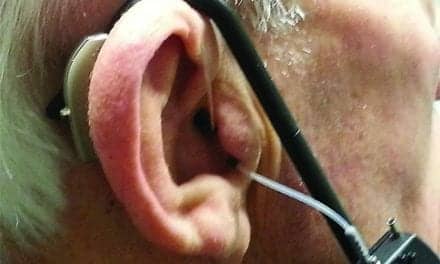Researchers reported on the discovery of the molecular mechanism of noise-induced hearing loss and showed that it could be mitigated with medication.
Thanos Tzounopoulos, PhD, and his Pitt collaborators Amantha Thathiah, PhD, and Chris Cunningham, PhD, reported on the discovery in a paper published in the Proceedings of the National Academy of Sciences.
Tzounopoulos, director of the Pittsburgh Hearing Research Center at the University of Pittsburgh School of Medicine has focused his scientific career on investigating how hearing works and developing ways to treat tinnitus and hearing loss.
Noise-Induced Hearing Loss
The study showed that noise-induced hearing loss, which affects millions of Americans, stems from cellular damage in the inner ear that is associated with the excess of free-floating zinc, a mineral that is essential for proper cellular function and hearing. Experiments in mice showed drugs that work as molecular sponges trapping excess zinc can help restore lost hearing or, if administered before an expected loud sound exposure, can protect from hearing loss.
“Noise-induced hearing loss impairs millions of lives but, because the biology of hearing loss is not fully understood, preventing hearing loss has been an ongoing challenge,” says senior author Tzounopoulos, endowed professor and vice-chair of research of otolaryngology at Pitt.
While some experience noise-induced hearing loss as a result of an acute traumatic injury to the ear, others notice a sudden hearing impairment after being continuously exposed to loud noise, for example in a battlefield or at a construction site. Others notice their hearing deteriorating after attending a loud music show.
Researchers say such noise-induced hearing loss can be debilitating. Some people start hearing sounds that aren’t there, developing a condition called tinnitus, which severely affects a person’s quality of life.
Tzounopoulos’ research, which focuses on the biology of hearing, tinnitus, and hearing loss, strived to determine the mechanistic underpinnings of the condition in the effort to lay the groundwork for the development of effective and minimally invasive treatments in the future.
Hearing Loss Treatment
By performing experiments in mice and on isolated cells of the inner ear, researchers found that hours after mice are exposed to loud noise, their inner ear zinc level spikes. Loud sound exposure causes a robust release of zinc into the extra and intracellular space which, ultimately, leads to cellular damage and disrupts normal cell-to-cell communication.
Thankfully, this discovery opens doors for a possible solution. Experiments showed mice who were treated with a slow-releasing compound that trapped excess free zinc were less prone to hearing loss and were protected from noise-induced damage.
Further reading: France Approves Gene Therapy Clinical Trial to Treat Hearing Loss in Children
Researchers are currently developing a treatment to be tested in preclinical safety studies with the goal of making it available as a simple, over-the-counter option to protect oneself from hearing loss.
Other authors of the study are first author Brandon Bizup, PhD, and co-author Sofie Brutsaert, both of Pitt.
Featured image: Thanos Tzounopoulos, PhD. Photo: Joshua Franzos





